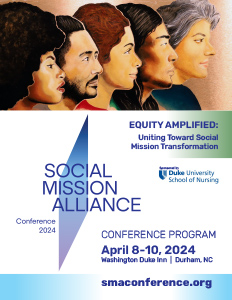Concurrent Breakout Sessions
Academic Medical-Legal Partnerships: Arming the Next Generation of Healthcare Providers with Tools to Address Patients' Health Harming Legal Needs and Help Advance Health Equity: Q&A and Discussion
Tuesday, April 9, 2024
11:15 AM - 11:20 AM East Coast USA Time
Location: Biddle
- VG
Vicki Girard, JD (she/her/hers)
Faculty Director, Georgetown Health Justice Alliance and Professor of Law, Legal Practice
Georgetown Law Center
Georgetown Law Center
Bethesda, Maryland, United States
Presenter(s)
Proposal: We teach health professions students that more than 80% of health is based on the social determinants of health (SDoH) and that negative SDoH contribute to poor medical outcomes and create barriers to well-being, especially for patients from historically marginalized communities. Generally, however, they graduate knowing “about” SDoH but not how to address them. For example, they may understand the negative impact that mold and mildew will have on childhood asthma—but they are less likely to know how to help a family whose landlord refuses to eliminate those poor breathing triggers.
In part, this educational gap persists because students do not learn specifically about those SDoH that require legal advocacy to overcome (e.g., poor housing conditions, requests for employment or educational accommodations that are ignored, insurance and public benefit denials, food insecurity, etc.) or how to collaborate directly with lawyers to address them. Medical-legal partnerships (MLPs), which integrate lawyers into healthcare teams, provide innovative Interprofessional Education (IPE) opportunities to help fill this gap. Academic-MLPs like Georgetown University’s Health Justice Alliance (HJA) offer a variety of clinical IPE environments that teach students how to use law and policy as tools to treat SDoH that present as unmet legal needs in their patient populations.
In this presentation, the co-founder and current Faculty Director of the HJA will briefly describe the MLP approach to healthcare, the effort to bring the model to Georgetown, and concrete examples of different IPE opportunities and training modalities for medical, nursing, health administration, and law students that have been successful and that other institutions may also want to consider. Based on experience establishing 3 Academic MLPs serving pediatric, cancer, and perinatal patients and working closely with medical faculty and with Georgetown’s academic health partner, MedStar Health, she will describe how Academic MLPs can provide students with light, medium, and intense IPE “touches” that increase knowledge, serve the local and broader communities, and contribute to research and scholarship aimed at advancing health equity.
While academic MLPs are more common at law schools, they have much to offer across undergraduate and graduate education settings. By fostering interdisciplinary teams of healthcare professionals who are adept at working with lawyers and using law and policy as upstream solutions to combat SDoH, Academic MLPS provide a pathway to overcome the sense among healthcare professionals that SDoH are persistent, intractable problems outside of their control.
In part, this educational gap persists because students do not learn specifically about those SDoH that require legal advocacy to overcome (e.g., poor housing conditions, requests for employment or educational accommodations that are ignored, insurance and public benefit denials, food insecurity, etc.) or how to collaborate directly with lawyers to address them. Medical-legal partnerships (MLPs), which integrate lawyers into healthcare teams, provide innovative Interprofessional Education (IPE) opportunities to help fill this gap. Academic-MLPs like Georgetown University’s Health Justice Alliance (HJA) offer a variety of clinical IPE environments that teach students how to use law and policy as tools to treat SDoH that present as unmet legal needs in their patient populations.
In this presentation, the co-founder and current Faculty Director of the HJA will briefly describe the MLP approach to healthcare, the effort to bring the model to Georgetown, and concrete examples of different IPE opportunities and training modalities for medical, nursing, health administration, and law students that have been successful and that other institutions may also want to consider. Based on experience establishing 3 Academic MLPs serving pediatric, cancer, and perinatal patients and working closely with medical faculty and with Georgetown’s academic health partner, MedStar Health, she will describe how Academic MLPs can provide students with light, medium, and intense IPE “touches” that increase knowledge, serve the local and broader communities, and contribute to research and scholarship aimed at advancing health equity.
While academic MLPs are more common at law schools, they have much to offer across undergraduate and graduate education settings. By fostering interdisciplinary teams of healthcare professionals who are adept at working with lawyers and using law and policy as upstream solutions to combat SDoH, Academic MLPS provide a pathway to overcome the sense among healthcare professionals that SDoH are persistent, intractable problems outside of their control.
Learning Objectives:
- define Medical-Legal Partnership and identify the unique features of an Academic Medical Legal Partnership.
- list at least 3 different academic medical-legal partnership IPE options and identify at least one that they could bring back to their own professional learning environment.
- decide if they have the capacity and interest to pursue (or expand) an academic medical-legal partnership and how that might benefit patient health and wellbeing within their community.

